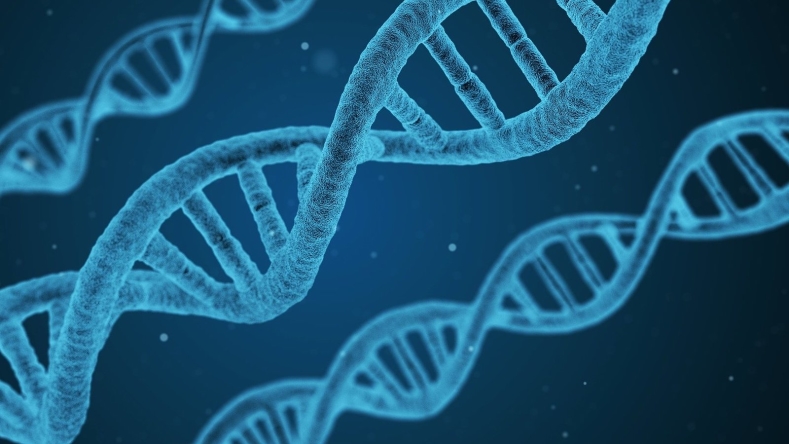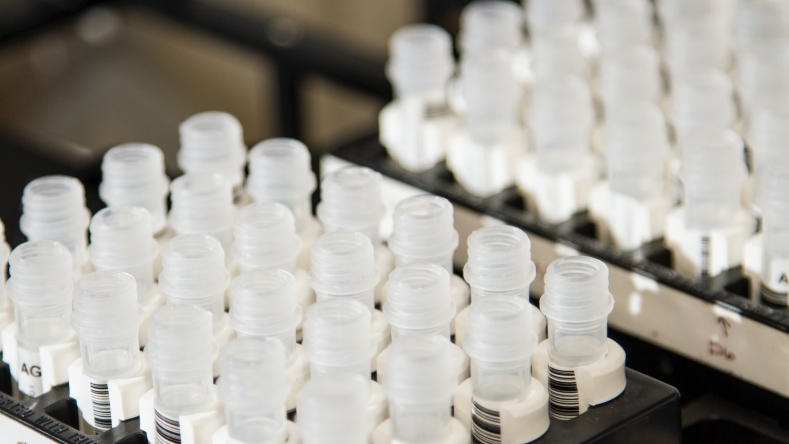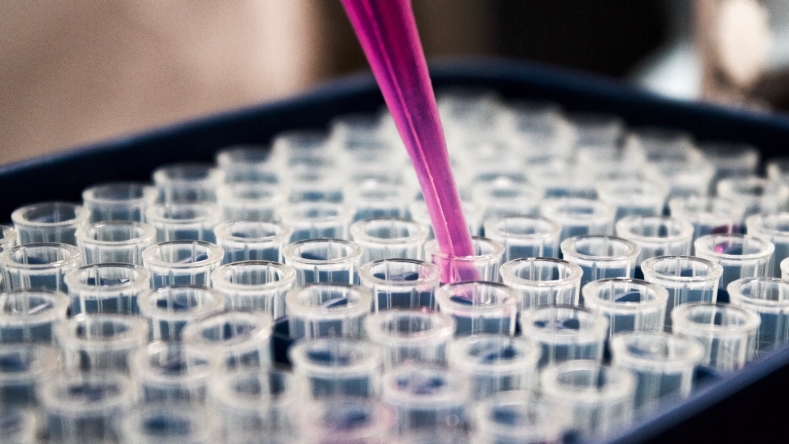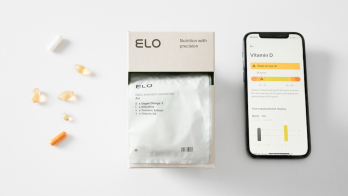What is nutritional genetics/genomics and is it right for you?
Nutrigenetics and nutrigenomics have been gaining popularity within the field of nutrition. But should you change your diet based on DNA tests? Here’s what the research has to say about nutrigenetics and nutrigenomics:

Nutrigenomics and nutrigenetics, also known as nutritional genomics and nutritional genetics, may seem like relatively new words and that’s because they are! Science has only just begun to understand the relationship between nutrition and genetics within the last decade.
Should you change your diet based on your genetic profile? Before answering this question, let’s define what nutrigenomics and nutrigenetics are and why they may be beneficial.
Genetics 101
Chromosomes: Chromosomes are long, thread-like molecules that house DNA within our cells and are used for creating new cells.
DNA: Also known as deoxyribonucleic acid, DNA is a molecule found in all of us that contains our specific biological instructions for growth.
Genes: Known for determining our internal and external characteristics, genes are made up of our DNA and are found in a specific sequence in every chromosome (which translates to a variety of characteristics).
Nucleotides: Nucleotides are the building blocks of DNA and contain one of four types of chemical bases (adenine, guanine, cytosine or thymine).
SNPS: SNPs stands for single nucleotide polymorphisms, which are variations or substitutions of one nucleotide base for a different nucleotide base. For example - substituting an adenine for thymine.

What is nutrigenetics?
Nutrigenetics is the field of study observing the effect of individual genes on dietary and nutrient components [1]. In simpler terms, nutrigenetics examines how our DNA influences nutrient metabolism.
What is nutrigenomics?
In contrast, nutrigenomics examines the effect of dietary and nutrient patterns on our gene expression [1]. Although similar to nutrigenetics, nutrigenomics examines how food, and the nutrients in our food, affect our DNA. Nutrigenomics and nutrigenetics are technically different, however, these terms are often used interchangeably.
DNA Testing 101
What do DNA tests evaluate?
DNA testing identifies the specifics of our DNA, including the patterns of our chromosomes and genes, and SNPs. Nutrigenetic DNA tests look at the genes, and the variations of these genes, involved with specific nutrients and metabolism.
What can DNA testing tell you?
DNA testing can tell you a wide range of information, from your ancestry to your health and family history. For example, DNA testing has been used to diagnose diseases, determine disease risk and predisposition to disease, identify hereditary disease patterns and even recommend treatment advice [2]. Nutrigenetics DNA tests can indicate a predisposition towards a nutrient deficiency or toxicity, food sensitivities, and even if you're potentially at risk for nutrition-related diseases.
What is involved in DNA testing?
Test takers are typically sent a kit in the mail and complete the test by giving a cheek, saliva, nasal or blood sample. The test is then mailed back to the company where the sample is analyzed in a lab and finally the results are sent back to the user [2]. Clinical DNA tests are typically performed by a medical professional.

How much do DNA tests cost?
Nutrigenetic tests vary in price and can cost up to a couple hundred dollars. The company Seaport Diagnostics Genopalate DNAFit Nutrigenomix
What does nutrigenetics/nutrigenomics tell you about your nutrition needs?
Nutrigenomics and nutrigenomics can reveal your predisposition to specific nutrient deficiencies or excesses as well as optimal dietary patterns. While DNA testing isn’t a standalone strategy for determining the right diet for you, it can provide clues about nutrients that you should focus on or deprioritize.
For example, researchers have discovered that the GC vitamin D protein is involved with the delivery of the vitamin D precursor, 25-hydroxyvitamin D, throughout the body, and individual genetic variations of GC may alter vitamin d absorption and status [7]. Depending on the variation, individuals may be genetically predisposed to vitamin d deficiency and need more vitamin D than the general population to maintain an optimal vitamin D level.
The FTO gene is linked to obesity. According to a review article in Frontiers in Genetics, The FTO gene has been found to be expressed in and influence the hypothalamus through appetite regulation and metabolism, therefore, influencing BMI and obesity [8]. The SNPs involved with the FTO gene play an important role by regulating its functioning levels, with high functioning levels leading to an increased predisposition to obesity [8].
Who can benefit from nutrigenetics/nutrigenomics?
Many groups of people can benefit from utilizing nutrigenetics and nutrigenomics for their nutritional needs. Groups with a risk of nutrient deficiency and chronic disease in general will greatly benefit from nutrigenetics/nutrigenomics. Here are some examples:

Vegans
One important nutrient for vegans is vitamin B12, since it is only found in animal products or fortified foods. Looking at the FUT2 gene, which plays a significant role in serum vitamin B12 levels, can help vegans identify if they have a predisposition toward vitamin B12 deficiency [9].
Women of childbearing age
Women of childbearing age may benefit from testing for the methylenetetrahydrofolate reductase (MTHFR) gene or the methionine synthase reductase (MTRR) gene, both of which play a crucial role in folate absorption, and metabolism [10]. Adequate folate is critical for preventing neural tube defects during pregnancy. In addition to folate metabolism, women of reproductive age are also at risk of developing iron deficiency anemia due to menstruation. The TMPRSS6 gene may help in determining risk (discussed below) [11].
Athletes
Athletes are already more predisposed to nutrient deficiencies, and nutrigenetics testing may aid in preventing these deficiencies. Specifically, athletes should keep an eye on iron, folate, vitamin B12, vitamin C, and vitamin D [12]. Iron deficiency in particular is common amongst elite athletes and plays a vital role in oxygen transport and storage. The TMPRSS6 gene has been associated with low hemoglobin levels and can aid in identifying iron deficiency [12].

Older adults
Older adults are also more likely to experience nutrient deficiencies due to undernutrition, change in body composition, physical impairments and disease state [13]. Although older adults can be at risk for multiple nutrient deficiencies, calcium and vitamin D are the most talked about due to their importance for bone health. Both the GC and CYP2R1 genes have been shown to be major players in vitamin D status, and specific polymorphisms of these genes may lead to vitamin D deficiency [12].
People at risk for heart disease
People at risk for heart disease can learn more about their health predispositions through genetic testing. The FTO is not only associated with obesity, but also heart disease. If someone has the AA genotype of the FTO gene, they could be more likely to develop cardiovascular disease because this genotype influences inflammation, lipid concentrations and adipose tissue [14].�
In addition, the CYP1A2 gene, which determines caffeine metabolism, can also tell us about our heart disease risk. In those with the CYP1A2 gene C allele polymorphism, consuming 2 or more cups of coffee per day has been associated with an increased risk for a heart attack [15]. The ADRA2B and ADORA2A genes are also associated with caffeine metabolism and may cause blood pressure surges from caffeine depending on the genotype [15].
Should you change your diet based on nutrigenetics/nutrigenomics results?
As of 2014, the Academy of Nutrition and Dietetics states that the field needs more research and does not currently support its sole use within clinical dietetics [16]. The reason being that the field of nutrigenomics and nutrigenetics is still relatively new and, therefore, shouldn’t be used as a sole parameter for personalized dietary recommendations.
One downfall of using nutrigenetics for personalized dietary advice is that even though you may have a genetic predisposition to a nutrient deficiency, those genes are not always activated/turned on [17]. Activated genes are defined as genes helping to create proteins that alter our cell function. Our genes are constantly turning on and off in response to our environment, and this field of study is known as epigenetics. For example, environmental and behavioral influences like substance use, allergens, aging, infections, chronic diseases and hormonal changes can alter our gene expression [18].
If we assumed that our genes were turned on all the time, then we would always be experiencing nutrient deficiencies, toxicities or disease-risks, but this is not the case. Therefore, having a genetic predisposition to a nutrient deficiency does not always mean you have that deficiency, and nutrigenetic testing should always be part of a larger nutrition evaluation that includes biochemical assessments, dietary intake, family history, metabolic risk factors for disease (blood pressure, lipid levels, glucose levels, weight etc.), physical activity, social factors and environmental factors [16].
Summary
Nutrigenomics examines the effect of food on the genome, while nutrigenomics focuses on the effect of our genes on our dietary patterns and nutrient needs. Nutrigenetics tests can educate us about genetic predispositions toward nutrient deficiencies and toxicities, and may aid in the diagnostic process. Although the field of nutrigenomics and nutrigenetics have great potential for the future, users should proceed with caution as it is still relatively new.
Key takeaways
Nutrigenomics and nutrigenetics are relatively new fields that examine the relationship between nutrition and genetics.
Research has shown that nutrigenomics and nutrigenetics may be especially beneficial for groups that are prone to nutrient deficiencies or chronic diseases
Many companies have started using nutrigenomics through genetic testing, but the Academy of Nutrition and Dietetics states that the field needs more research and does not currently support it as a sole parameter for personalized dietary recommendations.
References
Farhud, D., Zarif Yeganeh, M., & Zarif Yeganeh, M. (2010). Nutrigenomics and nutrigenetics. Iranian journal of public health, 39(4), 1–14.
National Institutes of Health. (2019, February 13). Genetic Testing FAQ. National Human Genome Research Institute.
https://www.genome.gov/FAQ/Genetic-Testing
.Seaport Diagnostics. (2021). Vitamins DNA Test.
https://shop.seaportdx.com/products/vitamins/
Genopalate. (2021). Start Your Genomic Nutrition Journey.
https://www.genopalate.com/pages/purchase
DNAFit. (2021). Compare DNA Test Kits.
https://www.dnafit.com/us/store/
Nutrigenomix. (2021) Genetic Testing for Personalized Nutrition.
https://nutrigenomix.com/
Bouillon, R., Schuit, F., Antonio, L., & Rastinejad, F. (2020). Vitamin D Binding Protein: A Historic Overview. Frontiers in endocrinology, 10, 910.
https://doi.org/10.3389/fendo.2019.00910
Lan, N., Lu, Y., Zhang, Y., Pu, S., Xi, H., Nie, X., Liu, J., & Yuan, W. (2020). FTO - A Common Genetic Basis for Obesity and Cancer. Frontiers in genetics, 11, 559138.
https://doi.org/10.3389/fgene.2020.559138
Surendran, S., Adaikalakoteswari, A., Saravanan, P., Shatwaan, I. A., Lovegrove, J. A., & Vimaleswaran, K. S. (2018). An update on vitamin B12-related gene polymorphisms and B12 status. Genes & nutrition, 13, 2.
https://doi.org/10.1186/s12263-018-0591-9
Vidmar Golja, M., Šmid, A., Karas Kuželički, N., Trontelj, J., Geršak, K., & Mlinarič-Raščan, I. (2020). Folate Insufficiency Due to MTHFR Deficiency Is Bypassed by 5-Methyltetrahydrofolate. Journal of clinical medicine, 9(9), 2836.
https://doi.org/10.3390/jcm9092836
Pei, S. N., Ma, M. C., You, H. L., Fu, H. C., Kuo, C. Y., Rau, K. M., Wang, M. C., & Lee, C. T. (2014). TMPRSS6 rs855791 polymorphism influences the susceptibility to iron deficiency anemia in women at reproductive age. International journal of medical sciences, 11(6), 614–619.
https://doi.org/10.7150/ijms.8582
Guest, N. S., Horne, J., Vanderhout, S. M., & El-Sohemy, A. (2019). Sport Nutrigenomics: Personalized Nutrition for Athletic Performance. Frontiers in nutrition, 6, 8.
https://doi.org/10.3389/fnut.2019.00008
Roberts, H. C., Lim, S., Cox, N. J., & Ibrahim, K. (2019). The Challenge of Managing Undernutrition in Older People with Frailty. Nutrients, 11(4), 808.
https://doi.org/10.3390/nu11040808
Gustavsson, J., Mehlig, K., Leander, K., Lissner, L., Björck, L., Rosengren, A., & Nyberg, F. (2014). FTO genotype, physical activity, and coronary heart disease risk in Swedish men and women. Circulation. Cardiovascular genetics, 7(2), 171–177.
https://doi.org/10.1161/CIRCGENETICS.111.000007
De Caterina, R., & El-Sohemy, A. (2016). Moving towards Specific Nutrigenetic Recommendation Algorithms: Caffeine, Genetic Variation and Cardiovascular Risk. Journal of nutrigenetics and nutrigenomics, 9(2-4), 106–115.
https://doi.org/10.1159/000446801
Camp, K. M., & Trujillo, E. (2014). Position of the Academy of Nutrition and Dietetics: nutritional genomics. Journal of the Academy of Nutrition and Dietetics, 114(2), 299–312.
https://doi.org/10.1016/j.jand.2013.12.001
Korthals, M., Komduur, R. (2010). Uncertainties of Nutrigenomics and Their Ethical Meaning. J Agric Environ Ethics, 23, 435–454.
https://doi.org/10.1007/s10806-009-9223-0
Center for Disease Control and Prevention. (2020, August 3). What is Epigenetics?
https://www.cdc.gov/genomics/disease/epigenetics.htm





